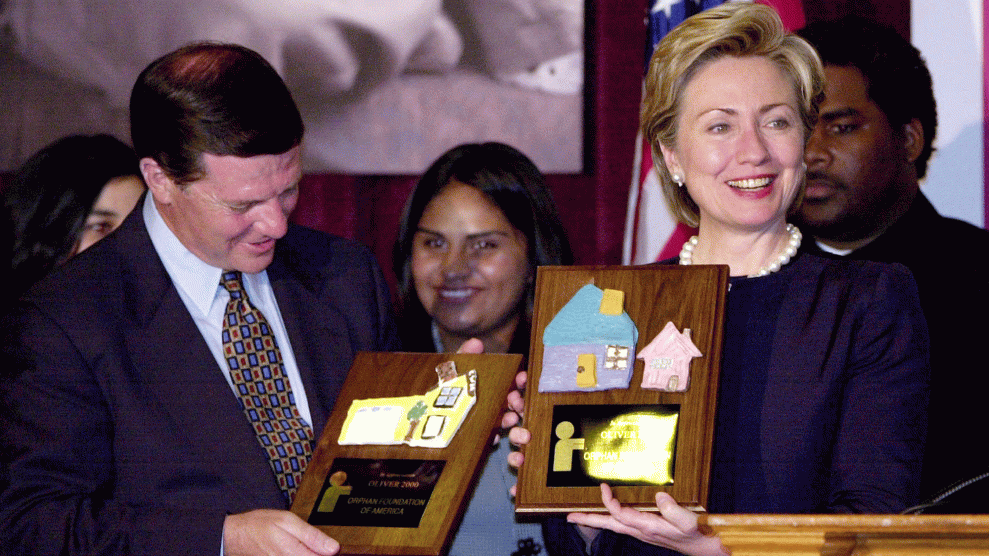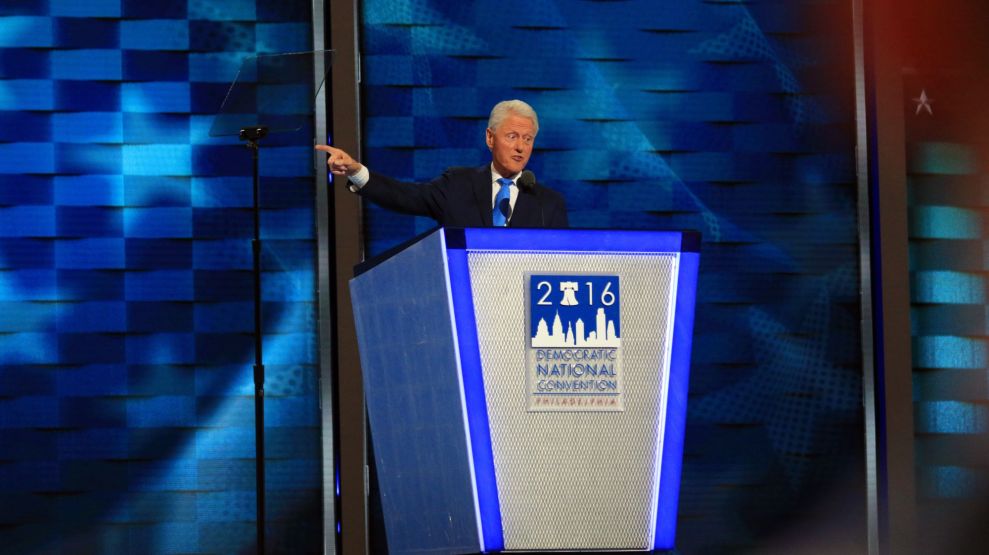
First lady Hillary Clinton and House Majority Whip Tom DeLay display their Orphan Foundation of America's Oliver Awards at the organization's annual dinner in Washington in June 2000.AP Photo/Nick Wass
As president, Bill Clinton didn’t have many political enemies more dogged than Tom DeLay. The Texas Republican, who served as the House majority whip and was known as “the Hammer,” spent some of his congressional tenure trying to impeach the president for the Monica Lewinsky scandal. But Hillary Clinton’s campaign has been invoking DeLay’s name a lot lately to demonstrate that she can reach across the aisle to work productively with anyone—even Tom DeLay.
It’s a great narrative. As the story goes, Clinton, as first lady, set aside partisan differences to find common ground with DeLay even as he was mercilessly attacking her husband and obstructing his agenda. By the campaign’s telling, the pair first worked together on an adoption bill that became law in 1997 and helped thousands of foster children find loving homes. Clinton has been telling the story on the stump for more than a decade now, but it’s been especially prominent during this presidential campaign, emphasized repeatedly by the candidate and her surrogates, most notably by her husband Bill, who brought it to prime-time TV during his Democratic National Convention speech last month.
There’s just one problem with the story: It isn’t accurate. Over the years, the tale of Tom and Hillary has grown in mythic proportions, as Bill and others have conflated dates and confused events in a way that makes a better story but vastly overstates the relationship between DeLay and Hillary Clinton. “I don’t remember ever working with her” on that bill, DeLay told Mother Jones. DeLay is no Hillary Clinton fan—earlier this year, he gleefully predicted that she would soon be indicted over her email problems—but his recollection about the foster care work is backed up by legislative and White House records, video archives, and confirmed by several people involved with the bill. The Clinton campaign did not respond to a request for comment.
The Adoption and Safe Families Act of 1997 (ASFA) forced states to speed up the termination of parental rights of people whose children ended up in foster care so the children could be put up for adoption. Clinton and her allies have frequently invoked the measure during her presidential campaign.
Ann Lewis, a former adviser to Hillary Clinton, wrote in a Philadelphia Inquirer op-ed last year that Clinton had “worked across the partisan aisle” with DeLay to hold events at the White House in support of the ASFA. On a conference call with children’s advocates this June, Lewis again discussed how Clinton had worked with DeLay to pass the ASFA while he was attempting to “reverse the outcome of the 1996 election.”
At a Democratic town hall in February this year, Hillary Clinton answered a question about bipartisanship by saying that as first lady, she’d worked on foster care and adoption with DeLay, “one of the most partisan Republicans in the Congress.”
And Bill Clinton ran with this theme earlier this year in a stump speech in New Hampshire, saying, “She and Tom DeLay got together, and one of the happiest bill signings I ever did was signing the bill they agreed on.”
The former president elaborated on the story in his lengthy introduction of his wife at the Democratic National Convention last month, when he emphasized her ability to cross party lines.
In 1997, she also teamed with the House minority leader, Tom DeLay, who maybe disliked me more than any of Newt Gingrich’s crowd. They worked together to increase adoptions of children out of foster care. She wanted to do it because she knew that Tom, for all of our differences, was an adoptive parent and she honored him for doing that. The bill that they worked on was passed with an overwhelming bipartisan majority and led to a big increase of children out of foster care.
Much in these stories is wrong, starting with the fact that DeLay was not an “adoptive parent,” a small but recurring error by the Clintons that nettles him. He was a foster parent to three children, but he never adopted any of them. And these yarns vastly overstate Hillary Clinton’s relationship with the former Republican leader. That’s because while Clinton may have worked on the 1997 adoption bill, DeLay did not. “I remember the bill,” he says. “It wasn’t mine.”
The ASFA was largely crafted by the Republican-controlled House Ways and Means Committee and championed by its lead sponsor, Rep. Dave Camp (R-Mich.). DeLay, who as whip was in charge of vote-counting and arm-twisting for the Republican agenda, was not a member of the committee. (DeLay was one of 31 co-sponsors of the bill in the House.)
“There’s no way [Hillary Clinton and DeLay] worked together on that,” says Cassie Statuto Bevan, the former policy director for the National Council on Adoption who worked on the legislation as a Republican staffer on the Ways and Means Committee. She later went to work on DeLay’s congressional staff and also helped him set up a home for foster children in Texas. She says Clinton was probably focused primarily on winning over Democrats, some of whom saw the bill as punitive and likely to have negative impacts on families of color. Shortly before the ASFA’s introduction, the Clinton administration’s Health and Human Services Department issued a report on barriers to adoption that recommended many of the provisions that ultimately ended up in the bill. Hillary Clinton and her staff were deeply involved in that process. They hosted an event at the White House to promote the HHS adoption report, but DeLay didn’t attend, according to video and transcripts from the event.
Bevan says she never had any involvement with Clinton or anyone from her staff. “I think this narrative about DeLay and Clinton serves her purpose, so she can say, ‘I even worked with Tom DeLay.’ It’s an applause line. Not the truth, but an applause line.”
Her recollections are confirmed by Ron Haskins, a Republican child-welfare advocate who was the staff director of the Ways and Means Human Resources Subcommittee at the time the ASFA passed. He says Hillary Clinton wasn’t engaged with the Republicans generally. “I never heard from Hillary or anybody on her staff,” says Haskins, who now works at the Brookings Institution think tank. “I don’t have an ax to grind against her. Just never talked to her.”
Some Democrats who were party to the negotiations likewise did not recall DeLay being involved. (Some of them are still involved in Democratic politics, and they declined to speak on the record.) Nor did Richard Gelles, now the dean of the school of social policy at the University of Pennsylvania, who also worked on the bill as a GOP committee staffer. He remembers Clinton’s work on the bill but says, “Tom DeLay was not involved at all.”
On November 19, 1997, when the adoption bill went to the White House for that happy bill signing Bill Clinton invoked on the stump in New Hampshire, DeLay was not in the room. Hillary Clinton, who emceed the signing ceremony, never mentioned him in her speech or long list of acknowledgements. (Watch a video of the event here.)
Later, DeLay got more involved in the Foster Care Independence Act, another bill that Clinton lobbied for as first lady, and he testified at a hearing on it in his capacity as a foster parent, among other efforts. But Bevan says DeLay’s interaction with Clinton on this bill was likewise nonexistent. When the White House held a signing ceremony for the bill in December 1999, Clinton again was front and center, making introductions and thanking critical players. She made no mention of DeLay, and he wasn’t present.
DeLay did go to the White House for an event in September 1999 promoting adoption. John Harris writes in his book on the Clinton presidency, The Survivor, that Bill Clinton invited DeLay to the event as a way of showing he didn’t hold grudges in politics. Harris doesn’t mention Hillary Clinton playing a role.
The next year, the Orphan Foundation of America gave Hillary Clinton and DeLay awards for their work on foster care—Clinton for her work on the ASFA and DeLay for his work on the Foster Care Independence Act. In his speech, DeLay acknowledged the awkwardness of their sharing the stage and gave no indication the two had a chummy working relationship. “Now, I do not for a moment imagine I will be hanging around the East Wing anytime soon, or that the president and I will start spending our weekends reminiscing together about the good old days,” DeLay said. Of Hillary Clinton, he said, “We do in fact maintain profound and principled differences, but I am certain we are both pursuing in our own ways the same goal, and that’s a stronger America that reaches out to every child, one child at a time.”
At that ceremony, Clinton disclosed how she first learned about DeLay’s role as a foster parent: from her daughter, Chelsea, who’d sat next to DeLay at the 1997 inauguration lunch. “She had Strom Thurmond on one side of her and me on the other,” DeLay recalls. “I thought, ‘What a terrible thing to do a young lady.’ Strom Thurmond, he kept hitting on her.” (Clinton once revealed in a speech that Thurmond had in fact turned to her then-16-year-old daughter and said, “Chelsea, if I were a younger man, I’d court you.”)
DeLay says he never had any meaningful interaction with Clinton while he was in Congress. During her tenure in the Senate, the only joint effort that he or Bevan could recall came in 2003, when DeLay and Clinton hosted a screening on Capitol Hill of Denzel Washington’s foster care movie, Antwone Fisher. The pair co-wrote an op-ed when the film came out to highlight the plight of kids languishing in foster care. At the screening, Judy Woodruff interviewed them and dubbed them the “odd couple.” Clinton told Woodruff, “Tom would probably be in trouble in the place he comes from if he worked with me too much.”
According to DeLay, the Woodruff interview and movie screening were the extent of their personal involvement. “I never talked to her, other than us being at that television interview that both of us thought was kind of weird,” he says. “And I would remember. I have no knowledge of working with her other than that.”
DeLay resigned from the House in 2006 when he was indicted for campaign-finance-related charges, putting an end to any bipartisan opportunities with Clinton. (He was convicted of money laundering, but the charges were later overturned.) But now that Clinton is running for president, she has resurrected the odd-couple myth and transformed it into an article of faith about her ability to work across the aisle. It does make for a good campaign story. Too bad most of it isn’t true.














